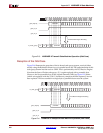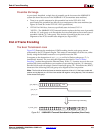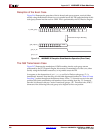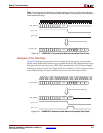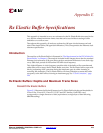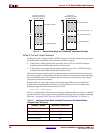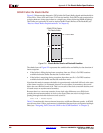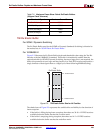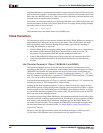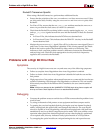
222 www.xilinx.com Ethernet 1000BASE-X PCS/PMA or SGMII v9.1
UG155 March 24, 2008
Appendix E: Rx Elastic Buffer Specifications
R
SGMII Fabric Rx Elastic Buffer
Figure E-2 illustrates the alternative FPGA fabric Rx Elastic Buffer depth and thresholds in
Virtex-II Pro, Virtex-4 FX and Virtex-5 LXT device families. Each FIFO word corresponds to
a single character of data (equivalent to a single byte of data following 8B10B decoding).
This buffer can optionally be used to replace the Rx Elastic Buffers of the RocketIO (see
“Receiver Elastic Buffer Implementations” in Chapter 8).
The shaded area of Figure E-2 represents the usable buffer availability for the duration of
frame reception.
• If the buffer is filling during frame reception, there are 122-66 = 56 FIFO locations
available before the buffer reaches the overflow mark.
• If the buffer is emptying during reception, then there are 62-6 = 56 FIFO locations
available before the buffer reaches the underflow mark.
Note that this analysis assumes the buffer is approximately at the half-full level at the start
of the frame reception. As illustrated, there are two locations of uncertainty, above and
below the exact half-full mark of 64. This is as a result of the clock correction decision, and
is based across an asynchronous boundary.
Because there is a worst-case scenario of one clock edge difference every 5000 clock
periods, the maximum number of clock cycles (bytes) that can exist in a single frame
passing through the buffer before an error occurs is:
5000 x 56 = 280000 bytes
Table E-2 translates this into maximum frame size at different Ethernet speeds. At SGMII
speeds lower than 1 Gbps, performance is diminished because bytes are repeated multiple
times (see “Designing with Client-side GMII for the SGMII Standard” in Chapter 5).
Figure E-2: Elastic Buffer Size for all RocketIO families
128
66
122 - Overflow Mark
6 - Underflow Mark
SGMII FPGA Fabric
Rx Elastic Buffer
62



